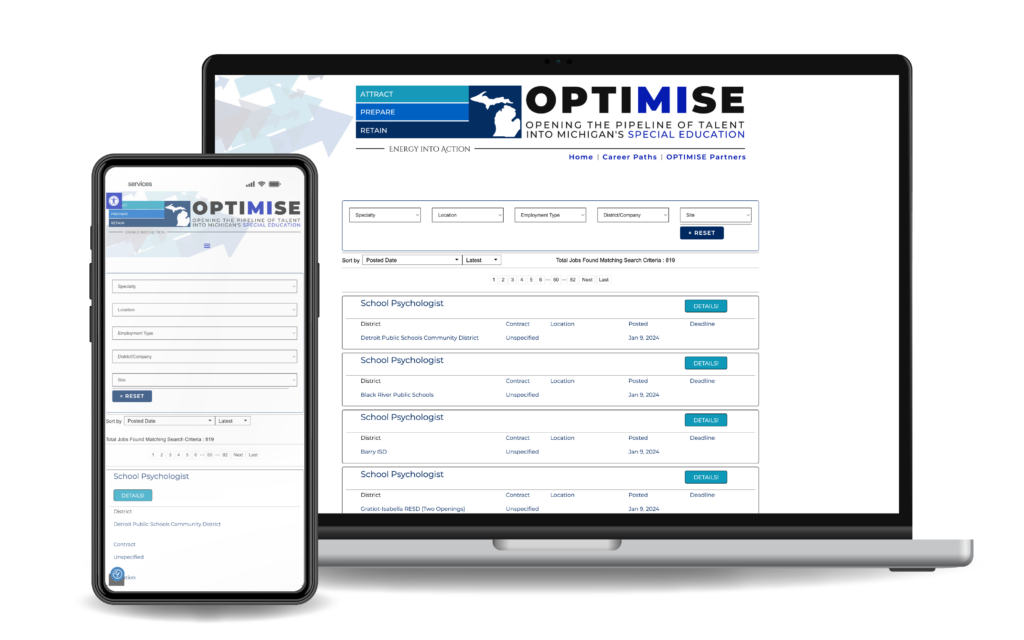Michigan’s Orientation & Mobility Specialists
A certified orientation and mobility specialist (COMS), is a highly trained expert who specializes in working with individuals who are blind, have low vision or who have functional visual limitations, and help them learn to travel safely, confidently, and independently in their everyday life.
Orientation and mobility specialists empower individuals with visual impairments to navigate their environment safely and independently. These specialists play a crucial role in enhancing the quality of life for individuals who are blind or visually impaired by teaching them essential skills and strategies for orientation (understanding their location) and mobility (moving around effectively).
Orientation and mobility specialists assess their clients’ unique needs, design personalized training programs, and utilize various techniques and tools to help individuals confidently travel through busy streets, public transportation systems, and indoor spaces. By creating self-reliance and spatial awareness, orientation and mobility specialists empower their clients to participate actively in their communities and lead fulfilling, independent lives.
Gary Garn
Orientation & Mobility Specialist
Eastern Upper Peninsula ISD

Start Your Michigan Orientation & Mobility Specialist Journey
Step 1: Earn a bachelor’s degree in any field.
Step 2: Earn a master’s degree in orientation and mobility.
Step 3: Fieldwork.
- Earn 60 hours of practicum.
- Earn 600 hours in an internship.
Step 4: Take and pass the Certified Orientation and Mobility Specialist (COMS) Certification
- This certification allows you to work nationally and you are not currently required to obtain a Michigan state license.
Volunteer to Gain More Experience!
Get hands-on experience and find a classroom near you that is in need of a volunteer!
Job Shadow an Orientation & Mobility Specialist
To participate in a job shadow, reach out to a school district and request to job shadow an Orientation and Mobility Specialist for a day.
Each school district has their own policy when it comes to job shadowing, but you may need a state ID or a driver’s license to participate.
College Program Information
Click a point on the map to find degree programs, scholarships, grants, and organizations to join!
Michigan Orientation & Mobility Specialist Educational Funding
Free College Opportunities
Allows students to earn college credit (up to 10 courses) while in high school at no cost between 9th-12th grade. The classes that students are eligible for must not be offered by the high school or PSA and must lead towards postsecondary credit, accreditation, certification, and/or licensing.
How to apply – Students are to talk with their high school advisor on eligibility, application, deadlines, and college course options.
A Michigan Department of Education approved five-year program of study.
EMCs work closely with certain colleges to provide students with an opportunity earn a high school diploma and one or more of the following:
- 60 transferable college credits.
- An associate degree.
- A professional certification.
- The Michigan Early Middle College Association (MEMCA) technical certificate.
- Participation in a registered apprenticeship.
The Michigan Achievement Scholarship is designed to help students pursue their dreams, goals, and aspirations in the Mitten State! Graduating high school seniors are eligible to earn a skill certificate or degree at their local community college tuition-free just by filling out the new and simplified FAFSA.
State Scholarships & Grants
Michigan Reconnect is a scholarship program that pays you to attend your in-district community college tuition free or pays up to the in-district rate if you attend a community college where you’re considered out-of-district. Applicants must be 25 years old to apply.
Thirteen Promise Zones have already begun awarding scholarships. Educators, businesses, families and civic leaders are also striving to embed a pervasive culture of learning in these communities – an essential ingredient in any recipe for education success.
Amount: $2,000 – $5,500
Federal Scholarships & Grants
Colleges and career schools use the FAFSA form to determine how much financial aid you’re eligible to receive, which could include grants, scholarships, work-study funds, and loans.You must apply for aid every year.
The Federal Student Aid Estimator provides an estimate of how much federal student aid the student may be eligible to receive. These estimates are based on the Student Aid Index (SAI), an index to determine federal student aid eligibility.
Direct Subsidized Loans and Direct Unsubsidized Loans are federal student loans offered by the U.S. Department of Education (ED) to help eligible students cover the cost of higher education at a four-year college or university, community college, or trade, career, or technical school.
A federal grant for undergraduate students with financial need.
If you’re employed by a government or not-for-profit organization, you might be eligible for the PSLF Program. The PSLF Program forgives the remaining balance on your Direct Loans
Direct PLUS loans can help pay for education expenses not covered by other financial aid. The U.S. Department of Education makes Direct PLUS Loans to eligible graduate or professional students through schools participating in the Direct Loan Program.
Grant for undergraduate students with exceptional financial need, administered directly by financial aid office at each participating school, not all schools participate
part-time employment while enrolled in school, available to undergrad, grad, and professional students with financial need, available to full and part-time students, administered by participating schools, emphasizes employment in civic education and work related to course of study or civic education, on or off campus


